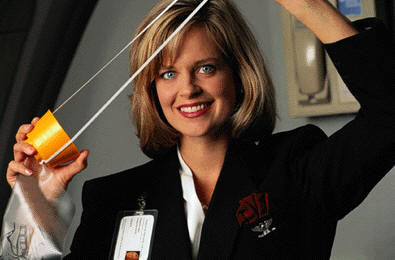
| NEWSROOM |
|
|
 |
|
|
|
|
|
|||
|
By Mike Mitchell |
||||
 |
February 5, 2010 - The Association of Professional Flight Attendants said on Wednesday that American Airlines' suggestion that it may train management employees to replace strikers is "an ill-conceived and doomed strategy." Said APFA president Laura Glading in a hotline message, nearly two days after word of the AA potential strategy was made public. The message is that they are willing to spend vast sums on a scheme doomed to failure, while continuing to avoid negotiating remaining economic issues at the bargaining table. When APFA returns to Washington at the end of February, in a continuation of intensified talks under Federal mediation, management will have to answer to its Flight Attendants and to the NMB for this double-standard. |
|||
|
"Though we
remain committed to the process of collectively achieving an
agreement that recognizes the sacrifices Flight Attendants have
made, AA's stalling and bad faith bargaining pushes us ever closer
to impasse." The
idea of training replacements came up in conversations between AA
management and the Federal Aviation Administration, and was
mentioned as a possibility rather than a final decision. APFA and
American have been negotiating a new contract for 21 months, Glading
has said she will ask the National Mediation Board to declare an
impasse if the two sides can't reach a deal during Feb. 27-March 3
talks in Washington, D.C.
American Airlines, the world’s second-largest carrier, is studying the training of replacement workers in case flight attendants strike after 20 months of contract talks. Airline officials told the Federal Aviation Administration they haven’t taken steps to proceed with the training, Alison Duquette, an FAA spokeswoman, said in an interview. Fort Worth, Texas-based American said its contingency planning was standard in the industry during labor negotiations. “It’s hard to know how successful something like that would be,” said Robert W. Mann of consultant R.W. Mann & Co. in Port Washington, New York. “It’s as effective as replacements can be with the proviso that customers usually notice the difference.” |
||||
|
Alerting the FAA about a possible training need highlights the tension at American as it prepares for five days of talks with the Association of Professional Flight Attendants starting Feb. 27. The union has said it will seek a release from further bargaining, a step toward a walkout, if no contract is reached. “The airline has told us they are considering” training new attendants, Duquette said. “If they decide to go ahead with that, we would be approving that training as part of the process.” Any shortened training sessions for replacement workers would require clearance by the agency, she said. American is “working to coordinate an approved contingency training program, should it be necessary,” while focusing on a labor agreement, said Missy Latham, a spokeswoman. “Contingency planning to help ensure continuity of an operation is standard in the airline industry during contract negotiations.” In 1993, American trained about 1,300 managers and volunteers in an attempt to keep more planes flying during a five-day strike by attendants. The work stoppage, which occurred just before Thanksgiving and ended when then-President Bill Clinton intervened, cost the carrier at least $10 million a day. Replacements underwent a 10-day course that focused on safety and was monitored by the FAA. Federal requirements call for 1 flight attendant for every 50 seats on an aircraft. American and the attendants’ union have been in talks since June 2008. Eleven contract articles remained open when the two sides ended a focused 11-day negotiating session on Jan. 21. After the new talks were scheduled this month, the union delayed a strike-authorization vote set for as early as Jan. 22. American is trying to contain labor costs after a second straight year of losses, and is seeking more productivity from workers. The attendants union wants to recover wage and benefit concessions it made in 2003 to help American avoid bankruptcy. If the National Mediation Board agrees the talks have reached an impasse, it would ask both the company and union to agree to binding arbitration. If both sides agree, further talks on a limited number of issues would be overseen by an independent arbitrator. A rejection of arbitration by either side would send talks into a 30-day cooling-off period. If no agreement is reached by the end of the 30 days, the union would be free to strike and the company to hire replacement workers. American also is in contract talks with unions for its pilots, mechanics and ground workers. |
| ©AvStop
Online Magazine
Contact
Us
Return To News
|
|